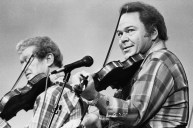Ken Burns' Country Music returned to PBS last night (Sept. 22) with one of its strongest episodes to date: "The Sons and Daughters of America (1964- 1968)."
The buildup to the politically tumultuous yet musically rich year of 1968 taught viewers more about Johnny Cash, Loretta Lynn and Minnie Pearl while introducing such decade-defining figures as Charley Pride, Jeannie C. Riley and Buck Owens.
Although the series often falls short of really digging into the societal circumstances surrounding country music's commercial rise and constant evolution, three of the following five standout moments from last night's episode should inspire reading, research and discussion about the genre's often shameful interactions with Civil Rights and women's issues.
Hate Groups Threatened Johnny Cash and His First Wife
Cash married Vivian Liberto on this day in 1954. The couple had four daughters during their 12-year union. pic.twitter.com/flUT6IKExE
— Johnny Cash (@JohnnyCash) August 7, 2019
Cash's Oct. 4, 1965 drug-related arrest at the US-Mexico border caught the ire of some over something other than the country star's amphetamine habit. Photos published after the arrest of Cash with his rarely seen first wife Vivian Liberto, an Italian American, led white supremacist groups to believe that Cash was married to a black woman. These hate groups even sent threats to the family.
Loretta Lynn Ignored Orders to Step Away from Charley Pride
One time, while co-presenting an industry award likely to be won by Pride, Lynn was warned to step away and not embrace her African American peer. As is still the case, telling Lynn to do something led to the opposite result.
"You can't tell people where to stand or what to play, or I never could (be told)," she quips.
None of this should come as a surprise from an ambassador of the same kindness learned from her late, great mentor Patsy Cline.
Jeannie C. Riley's Nightmarish CMA Awards Experience
In an often-retold story, what should have been a triumphant night for singer Jeannie C. Riley became an example of industry sexism. When she picked up her dress for the CMA Awards, the "Harper Valley PTA" singer was shocked to learn that producer Shelby Singleton—the husband of Margie Singleton and future owner of Sun Records—had a floor-length gown converted to a mini-skirt.
When approached by Riley about the wardrobe change, Singleton reportedly said, "You're not an artist, baby. You're a commodity—a mini-skirted, silver-booted commodity."
Buck Owens Listened Back to His Recordings Through Car Speakers
You don't have to be a tech-head or musician to notice the treble-heavy sound of Buck Owens and the Buckaroos' classic Capitol Records singles. As Burns' team explains it, Owens purposefully recorded songs this way with AM radio in mind. To be sure his trebly hits sounded great on the air, he listened back to each studio recording through car speakers.
Roger Miller Almost Quit Music Before "Dang Me" Became a Hit
In between his time struggling in Nashville alongside fellow songwriting underdogs Mel Tillis and Willie Nelson and his unfathomable 11 Grammy wins in two years (1965 and 1966), Roger Miller plotted a move from Nashville to Los Angeles, where he'd try his hand at comedy. Luckily, the overnight success of "Dang Me" kept him from straying West.
Now Watch: 5 Things You Didn't Know About Patsy Cline




